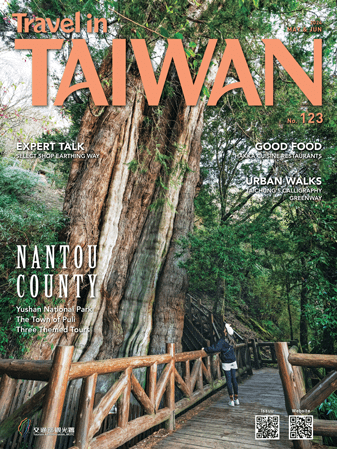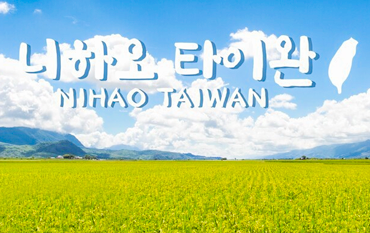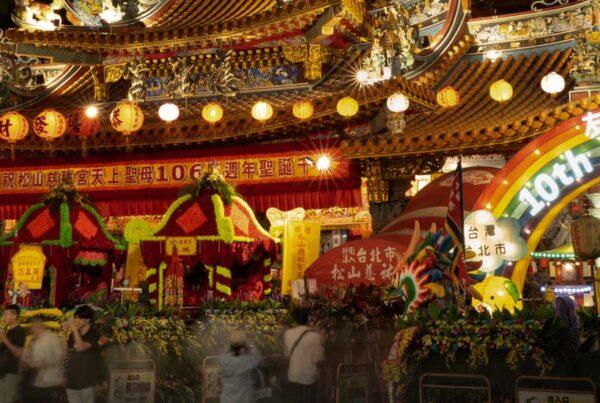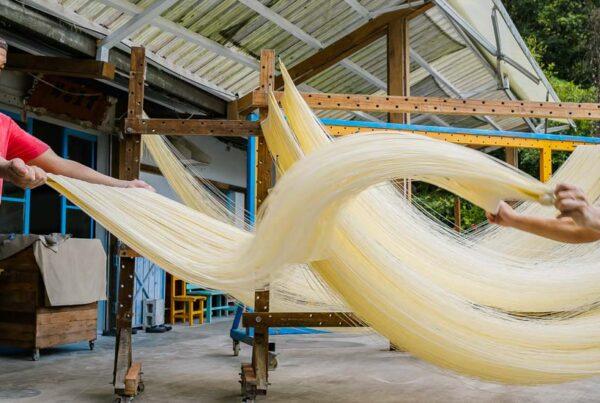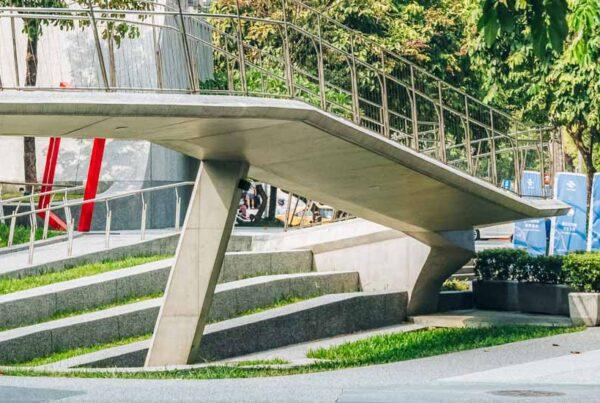Guanxi, Hsinchu (新竹關西)
Guanxi is a tranquil and uncomplicated small town that retains buildings of different architectural styles including Hakka, Minnan, and Japanese, each representing the marks of a different era and making the architecture the most interesting part of a walk around the town. In particular, walk along the lanes and alleys of the old streets around the traditional market and surprises await at every turn. After improvement work, the banks of the Niulan River have become a green riverside park that is a pleasant place to stroll. In recent years, restoration of old buildings and regeneration of the Guanxi Old Street have brought new vitality and a vibrant arts atmosphere to this once sleepy town.
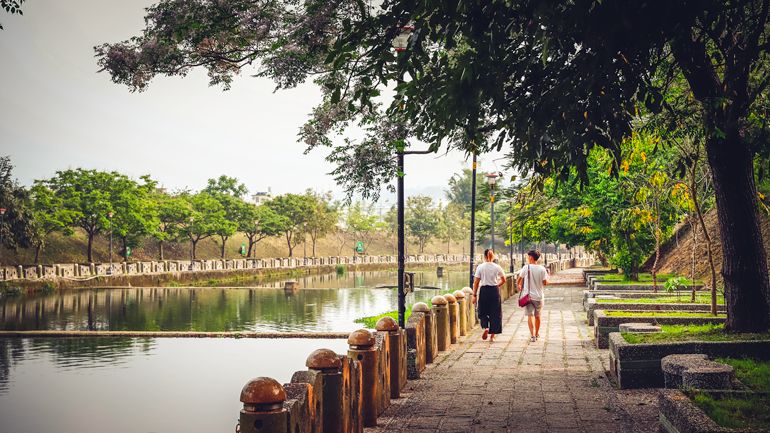
Getting There: From Taipei Bus Station take a Kuo-Kuang Bus (1820A) and get off at Guanxi Township Office (關西鎮公所) bus stop; from there, you can walk to places of interest.
Shidianzi Old Street (石店子老街)
Around 200 meters long, Shidianzi Old Street (Guanxi Old Street) is located on Zhongzheng Road and was once the most prosperous local street. However, industry declined over the years and only a dozen or so old houses remain on the entire street. That was until 69 Bookstore moved into one of the old houses a few years ago and combined with community power to attract other young people and businesses to set up shop here, including independent book shops, integrated cafés, handmade-product shops as well as a weekend/holiday market. Culture and arts was the platform that brought the street back to life.

Shidianzi No. 69 Organic Bookstore
(石店子69有機書店)
The 69 Bookstore operates on the basis of “a book in exchange for a book.” It sells independent and local publications that large book stores don’t stock and often holds arts lectures.

Add: No. 69, Zhongzheng Rd., Guanxi Township, Hsinchu County
(新竹縣關西鎮中正路69號)
Ye Tea 49 (冶茶四九)
The proprietor is a connoisseur of tea and pottery. Using a large amount of waste material, he has created a space for drinking tea and displaying his ceramic art works.

Add: No. 49, Zhongzheng Rd., Guanxi Township, Hsinchu County
(新竹縣關西鎮中正路49號)
Dream Theatre 52
As the name suggests, this is an integrated café serving handmade pastries and drinks that is combined with the concept of performance.


Add: No. 52, Zhongzheng Rd., Guanxi Township, Hsinchu County
(新竹縣關西鎮中正路52號)
Strolling Through Guanxi
There are many historic buildings/structures in the area around the Old Street, such as Dong’an Historic Bridge, Old Guanxi Police Station, Shude Hospital, Zheng Ancestral Hall, First Theater, King Tai Tea Company, Formosa Black Tea Co., and Sacred Heart Catholic Church, all worth a visit.
Dong’an Historic Bridge (東安古橋)
Built in 1933, this bridge has an elegant style. After the baptism of time, the bridge supports now have unique texture and luster. The riverbanks near the bridge have become a riverside park with a leisurely and relaxing atmosphere.
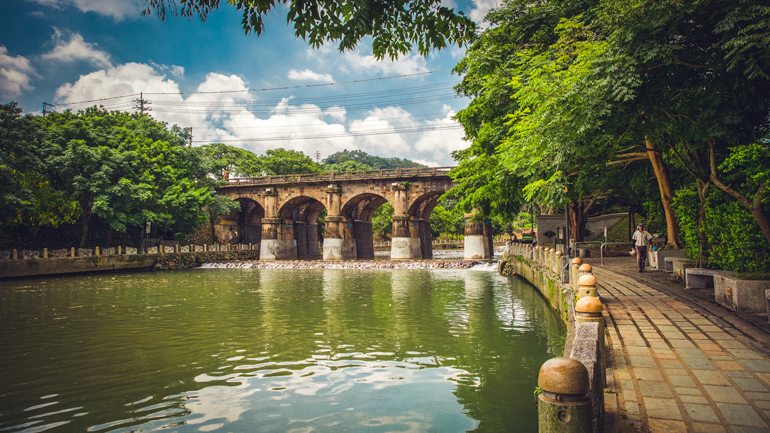

Old Guanxi Police Station, Station Chief’s Residence (舊關西分駐所、所長宿舍)
The Old Guanxi Police Station, dating from the Japanese Colonial Period is almost 100 years old. The Station Chief’s Residence is hidden away in the alley behind and, with its green garden, displays an elegant and reserved Japanese style. After being idle for years, the buildings were reopened to visitors in 2018.
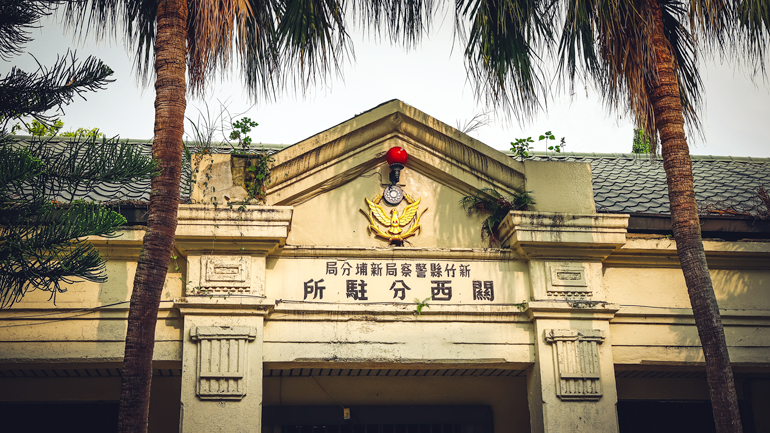
Old Guanxi Police Station
Add: No. 92, Zhongzheng Rd., Guanxi Township, Hsinchu County
(新竹縣關西鎮中正路92號)
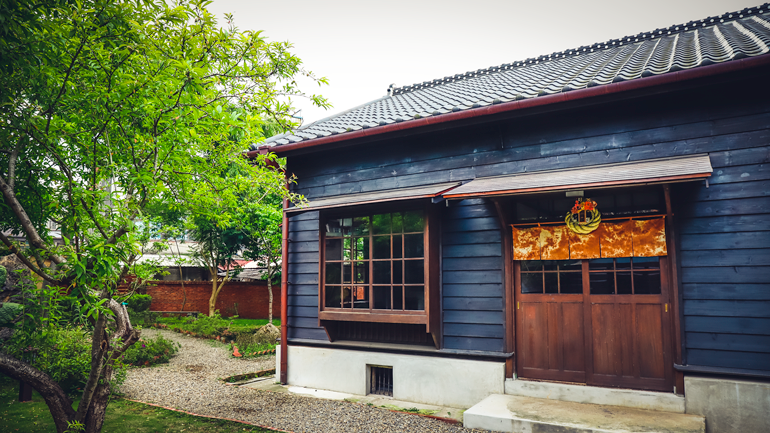
Chief’s Residence
Add: No. 9, Datong Rd., Guanxi Township, Hsinchu County
(新竹縣關西鎮大同路9號)
Guanxi Sacred Heart Catholic Church
(天主堂)
Built in 1956, the Guanxi Sacred Heart Catholic Church’s Gothic architectural style and lofty crucifix are very eye-catching. The church is an iconic Guanxi landmark. Its unique atmosphere has also made it the location for filming of various TV dramas.


Add: No. 126, Zhengyi Rd., Guanxi Dist., Hsinchu County
(新竹縣關西鎮正義路126號)
Luo Family Private School (羅屋書院)
This century-old traditional building is listed as a historic site of Hsinchu County. Although an ordinary residence, it has fine wall decorations befitting a temple. Various art events are frequently held in the square in front of the house.

Add: No. 79, Shangnanpian, Nanshan Borough, Guanxi Township, Hsinchu County
(新竹縣關西鎮南山里上南片79號)
Produce & Local Food
King Tai Tourist Tea Factory (錦泰觀光茶廠)
Established in 1936, this is one of only two surviving tea factories in Guanxi Township. It produces mainly Charcoal Roasted Oolong Tea and Hakka Bitter Orange Tea. Retaining a large factory building with large tea-making machines and equipment inside, it was transformed into a tourist factory and now gives visitors a taste of the heyday of the tea industry in Guanxi.

Add: No. 336, Zhongfeng Rd., Guanxi Township, Hsinchu County
(新竹縣關西鎮中豐路一段336號)
Tel: (03) 587-2051
Hours: 8:00-18:00 (guided tours need to be booked in advance)
Ang Gu Noodles (ㄤ咕麵)
Info added on March 27, 2020.
Ang Gu Noodles, which draws its name from the “anggu” sound Hakka people make when teasing babies, is a recommended option for grabbing lunch in town. The founder would make that sound whenever children visited what started out as a nameless noodle stand, and people began referring to the operation as such. Now run by the clan’s third generation in a centrally-located modern building, the joint continues to offer the original signature dry wheat noodles of yore. Get the set meal that comes with three different types of meatball – the one embedded with chunks of taro is especially tasty.


Add: No. 35, Guangfu Rd., Guanxi Township, Hsinchu County
(新竹縣關西鎮光復路35號)
Hours: 10:30-19:30, closed on Tuesday
Guanxi Stinky Tofu (關西臭豆腐)
This long-established stinky-tofu shop often has long queues outside. The fried tofu is crispy on the outside and soft on the inside. Accompanied by pickled cabbage, this is a food of the common people that is a local favorite.


Add: No. 4, Guangfu Rd., Guanxi Township, Hsinchu County
(新竹縣關西鎮光復路4號)
Hours: 14:00-20:00, Sat. 11:00-20:00; closed on Wednesday & Thursday
Guanxi Herbal Jelly Lane (關西仙草巷)
Guanxi’s herbal jelly is renowned across Taiwan. Locally-made herbal jelly is used on Herbal Jelly Lane. Many related foods have been developed by the businesses here. Visitors can try various herbal jelly-based foods in one place.

Add: No. 14, Zhongxing Rd., Guanxi Township, Hsinchu County
(新竹縣關西鎮中興路14號)
Hours: 10:00-20:30, Sat. 10:00-19:00; closed on Wednesday
Recommended Restaurant
Uni-Resort Haoke Zhuang (統一馬武督好客庄)
Add: No. 34, Jinshan Borough, Guanxi Township, Hsinchu County
(新竹縣關西鎮金山里34號)
Tel: (03) 547-8888
Website: www.uni-resort.com.tw
Recommended Restaurant
Fu-Lin Restaurant (福臨飯店)
Add: No. 124, Zhengyi Rd., Guanxi Dist., Hsinchu County
(新竹縣關西鎮正義路124號)
Tel: (03) 587-3575
Hours: 10:00-20:00
Hukou/Zhubei, Hsinchu
(新竹湖口•竹北)
Hukou Old Street in Hukou Township is a simple and unsophisticated street on which traditional building façades are well-preserved. The street has not seen much commercial development so it’s a good place to see the beauty and feel the charm of traditional Taiwanese architecture. Due to Zhubei’s rapid development, the rural scenes of days gone by are largely no longer seen, however, there are still a few traditional Hakka settlements. Some spaces have also been turned into arts settlements where visitors can wander around and soak up the arts atmosphere.
Getting to Hukou: From TRA Xinfeng Station take Zhongli Bus 5300 and get off at Hukou Old Street (湖口老街) bus stop; from there you can walk to places of interest.
Getting to Zhubei: From HSR Hsinchu Station take Hsinchu Transit System No. 7 bus and get off at New Tile House (新瓦屋); from there you can walk or take a taxi to places of interest
Hukou Old Street (湖口老街)
At either end of Hukou Old Street stand buildings that represent different religions, namely Hukou Old Catholic Church and Sanyuan Temple, displaying the diversity of local ethnic groups and the tracks of history. The red-brick buildings with arch façades of the Old Street are well-preserved; the interiors have a strong Minnan (Southern Fujian) flavor while the façades are Baroque style. The Old Street is quite short and doesn’t attract many people on ordinary days, so visitors can slowly wander and soak up the old-time atmosphere. On weekends, more tourists arrive, and the street comes to life as businesses that don’t open during the week open, giving the Old Street back some of the bustle and prosperity of its heyday.


Sanyuan Temple (三元宮)
Built in 1919, this is the local belief center as well as a county-listed historic site. The temple retains its original plain temple architectural style.

Add: No. 278, Hukou Old Street, Hukou Township, Hsinchu County
(新竹縣湖口鄉湖口老街278號)
Catholic Church (天主堂)
Built in 1966, this Catholic church was originally the base of an Italian missionary. After being left idle for years, a few years ago, after renovation, it was opened as a museum. It’s now a cultural space on the Old Street that’s well-worth a visit.


Add: No. 108, Hukou Old Street, Hukou Township, Hsinchu County
(新竹縣湖口鄉湖口老街108號)
Hours: 10:00-17:00, closed on Tuesday
Hukou Old Street Food
Xin You Restaurant (新友飲食店)
It may not look much to the untrained eye, but this is a long-established restaurant and queues can often be seen outside at dining times. It serves authentic Hakka food, including pork with pickled mustard, pork intestines with stir-fried ginger slices, Hakka stir-fried dishes, and red rice wine yeast duck.

Add: No. 235, Hukou Old Street, Hukou Township, Hsinchu County
(新竹縣湖口鄉湖口老街235號)
Tel: (03) 569-2798
Hours: 11:00-14:00, 17:00-19:00
Website: www.soyaway.com (Chinese)
SOYAWAY (豆之味豆腐坊)
The owner insists on using non-GMO soy beans that are grown without the use of pesticides and artificial fertilizer and also adheres to ancient tofu making techniques, with the aim of conveying the real delicious taste of bean products. Visitors can enjoy tofu pudding and soy milk here, as well as buy tofu, dried tofu, and tofu skin etc. as gifts. Tofu-making DIY experience classes can also be booked in advance.


Add: No. 226, Hukou Old Street, Hukou Township, Hsinchu County
(新竹縣湖口鄉湖口老街226號)
Tel: (03) 569-5605
Hours: 10:00-18:00
Bicycle Taro Paste (腳踏車芋泥)
This small cart might not catch the eye but it’s one of the hidden gems of the Old Street. Open for business at weekends only, it sells just taro paste, but offers two versions, plain taro paste and taro paste ice; with the emphasis on purely natural ingredients, both versions have a creamy and smooth texture with the light taste and fragrance of taro.


Add: No. 207, Hukou Old Street, Hukou Township, Hsinchu County
(新竹縣湖口鄉湖口老街207號)
Tel: (03) 569-6856
New Tile House, Zhubei (竹北 新瓦屋)
The New Tile House was originally a simple Hakka settlement. When land was requisitioned for the building of the Taiwan High Speed Rail, part of the settlement was preserved as New Tile House Hakka Culture Preservation Park. It is now an important art settlement in Zhubei. Performance, food, food agriculture groups, all providing interesting spaces with a Hsinchu or Hakka connections, have made their base in the park. Here, visitors can buy good products and fine ingredients in one place.


Add: No. 123, Sec. 1, Wenxing Rd., Zhubei City, Hsinchu County
(新竹縣竹北市文興路一段123號)
Tel: (03) 658-0651
Huo Zhe (或者)
This is an integrated space that combines a bookstore, a restaurant, and a shop. The first-floor bookstore mostly stocks humanities books on subjects such as environmentally-friendly farming and ethnic diversity. The second-floor restaurant serves healthy vegetable dishes and snacks, many of the ingredients used coming from local small farmers. The shop mainly sells stationery as well as products with a strong Hakka flavor produced by local small farmers, including soy sauce, kumquat sauce, and rice noodles.


Hours: 10:30-21:00, closed on second Monday of each month
Lu He Tang, Xiangding Café
(綠禾塘‧翔頂咖啡)
This is a general-goods store that sells local farm produce, from vegetables and steam bread to various flavorings, rice, beans, and noodles. Half of the space is occupied by Xiang Ding Coffee, the owner of which shares the same philosophy as Lu He Tang. Come here to sit in a corner and quietly enjoy a cup of good coffee.


Hours: 10:00-19:00, closed on Monday
Houshi Village, Zhubei (竹北 厚食聚落)
Hidden away near a main downtown road, this place looks from the outside like a large courtyard house, while inside it has six different businesses, namely a bean shop, oil shop, fermented-food shop, bakery, community kitchen, and café. The owners share the importance they attach to ingredients with the spirit of an artisan. Unlike most shop streets, Houshi Village is full of greenery and sunlight making it like a small market as well as a small rural village. With the good life shared here with a friendly attitude, the harmony between humans and nature creates a comfortable atmosphere.


Add: No. 95-5, Sec. 2, Guangming 6th Rd., Zhubei City, Hsinchu County
(新竹縣竹北市光明六路東二段95-5號)
Hours: 10:00-17:00, closed on Monday and Tuesday
Mr. Book Café (月讀)
This is both a book shop and a coffee shop. The books are mainly humanities books carefully selected by the owner. Even if you don’t want to buy a book, you can enjoy a cup of coffee here and share your thoughts on reading with the owner.

Add: No. 105, Chenggong 10th St., Zhubei City, Hsinchu County
(新竹縣竹北市成功十街105號)
Hours: 13:00-21:00, closed on Monday and Sunday
Liujia Historic Houses, Zhubei (竹北 六家古厝)
There are a number of old Hakka houses that exude an old-time air between the New Tile House Culture Preservation Park and the College of Hakka Studies of National Chiao Tung University. They are owned by the descendants of a man surnamed Lin who settled in the area in the Qing Dynasty and include the Assembly Hall, Lin Family Ancestral Hall, Zhongxiao Hall, and Dafudi Imperial Official’s Residence. Each with its own story and meaning, the buildings are must-visit places for anyone wanting to learn about Hakka culture and the characteristics of Hakka architecture. However, due to their advanced age some of the old buildings are undergoing restoration or a visit requires advance booking, so being able to take a look at the interior layout depends on luck.


Recommended Restaurant
Zunhuang Chinese Restaurant (尊煌中式餐館)
Add: No. 42, Xianzheng 6th Rd., Zhubei City, Hsinchu County
(新竹縣竹北市縣政六路42號)
Tel: (03) 553-8600
Hours: 11:00-14:00, 17:00-21:00
Recommended Restaurant
Happy Family Hakka Restaurant (全家福客家菜館)
Add: No. 118, Guangming 6th Rd., Zhubei City, Hsinchu County
(新竹縣竹北市光明六路118號)
Tel: (03) 656-2619
Hours: 11:30-14:00, 17:00-21:00
Hengshan, Hsinchu
Most of the residents of Neiwan are Hakka. Follow the development context of the local forestry and mining industries to understand how local industry developed, admire the simple and unadorned old houses on Neiwan Old Street, go to Neiwan Railway Station and feel the old-time air, to Neiwan Theater to see cultural relics, and to the Liu Xing-Qin’s Comics and Inventions Museum to marvel at the many vivid works by a master comic artist; of course, also don’t forget to enjoy some authentic Hakka dishes on the Old Street.
Getting There
From TRA Hsinchu Station take a Neiwan Branch Line train and get off at Neiwan.
From HSR Hsinchu Station walk to TRA Liujia Station; take a train to Zhuzhong, transfer to a Neiwan Branch Line train and get off at Neiwan.
Neiwan Old Street (內灣老街)
The area around Neiwan Old Street was originally a Hakka settlement and today many brick houses still retain a nostalgic flavor.

Various traditional Hakka foods and drinks can be enjoyed here, such as the traditional Hakka lei tea sold by A-Jhu Lei Cha; it is made by grinding ingredients such as sesame seeds, peanuts, and green tea into a powder and then adding hot water. A lei tea DIY experience is also available.



For lunch, visitors can dine at the Neiwan Theater Hakka restaurant. On entering, you’ll see an old-style general-goods store and hand-painted movie posters, with films from the 1950s to 70s shown on a large screen, seemingly taking people back in time.



Neiwan Theater Hakka Restaurant (內灣戲院人文客家菜館)
Add: No. 227, Zhongzheng Rd., Hengshan Township, Hsinchu County
(新竹縣橫山鄉中正路227號)
Tel: (03) 584-9360
Hours: 11:00-19:00
Neiwan is also famous for its ginger lily rice dumplings; the aromatic and chewy dumplings are a filling of ginger lily root ground into a powder, rice, and pork etc. wrapped in ginger lily leaves. Ciyu Steamed Vegetable Buns is another must-visit eatery for food lovers visiting the Old Street.

Zhudong, Hsinchu (新竹竹東)
Zhudong Township lies at the center of Hsinchu County and has a predominantly Hakka population. A good place to start a visit to Zhudong is the Zhudong Culture Creative Art Village to find out how cultural and creative energy has been tapped to good effect. Then proceed to the downtown area for a stroll, taking in Zhudong Timber Industry Exhibition Hall and Xiao Ru-song Art Park to get to know the township better through its history, art and culture. Finally, visit Zhudong Market, operating for almost 60 years. The market, well-loved by locals, is the largest Hakka market in Taiwan. Here, the warmth of the Hakka people can be felt and various traditional Hakka foods can be enjoyed.
Getting There: Take a train to Zhudong; from there you can walk to places of interest.
Zhudong Cultural-Creative Art Village
(竹東文創藝術村)
The Zhudong Cultural-Creative Art Village is a new tourist attraction that was formerly a cluster of Taiwan Railway Administration dormitories. During restoration new buildings were added and some of the old walls were kept. The merging of old and new now creates an artistic air. Color-painted walls that provide a good backdrop for photos and checking in can be seen all around the park area, some with Hakka tung blossom imagery, some in lively and cute calligraphy style. There is also a grassy area where concerts and markets and other events are sometimes held on weekends. Each of the businesses in the park is distinctive.

Old & Crazy
(舊事生活)
Old &Crazy has a spatial layout that is retro and trendy at the same time. The dishes contain many elements of Hakka cuisine, such as traditional Hakka deep-fried vegetables and fried Hakka crystal dumplings. Drinks include lei tea au lait and herbal tea.


Add: 1F, Bldg. D, No. 8, Ln. 194, Donglin Rd., Zhudong Township, Hsinchu County
(新竹縣竹東鎮東林路194巷8號D棟1樓)
Hours: 10:00-18:00, closed on Tuesday
Website: https://oldncrazy2017.business.site/
A Space
(一起灶)
This is a platform for various kinds of artisans and people with an interest in performing to share their skills and works. On weekdays, it has static exhibitions and pottery courses; events of different kinds are often held at weekends and holiday times. Snacks are the only food served and Hakka drinks such as Oriental Beauty Tea and lei tea are available.

Add: No. 12, Ln. 194, Donglin Rd., Zhudong Township, Hsinchu County
(新竹縣竹東鎮東林路194巷12號)
Hours: Thu. & Sun. 13:30 ~ 19:30
Zhudong Market
(竹東市場)
Open almost 60 years, this is a traditional market that is much-loved by locals; it is also the largest Hakka market in Taiwan. With around 480 stalls, it offers various kinds of tasty food inside and various of popular snacks can also be found in eateries around the market. Here, not only can the human warmth of the Hakka be felt, authentic traditional Hakka foods of all kinds can be enjoyed as well.
Ah-Ying Soup Dumplings
(阿英湯包)
The delicious soup dumplings are steamed to order; the soup oozes out when you first take a bite so you should be careful not to scald your mouth. The steamed dumplings and goat thick soup are also very popular.


Add: No. 32, Donglin Rd., Zhudong Township, Hsinchu County
(新竹縣竹東鎮東林路32號)
Hours: 15:30 ~ 23:00
Li’s Mitaimu
(李記米苔目)
The house special thick rice noodles are smooth and chewy. Even though only served with either mung beans or tapioca balls (fenyuan), a bowl of simple thick rice noodles with shaved ice is a popular cooling dessert that many locals have eaten in summer since childhood. In winter, the store changes to selling fried thick rice noodles. The savory and aromatic noodles very different to the summer version but still tasty.


Add: No. 312, Ren’ai Rd., Zhudong Township, Hsinchu County
(新竹縣竹東鎮仁愛路312號前)
Hours: 6:00-12:00
Ye Mama Squid Thick Soup
(葉媽媽魷魚羹)
Established over 60 years ago, the house special thick squid soup contains squid, chunks of pork, and deep-fried vegetables, with a dash of specially-mixed black vinegar adding a sweet touch to the delicious taste of the soup.


Add: No. 362, Ren’ai Rd., Zhudong Township, Hsinchu County
(新竹縣竹東鎮仁愛路362號)
Hours: 5:00-22:00
Cultural Spots
Xiao Ru Song Art Park
(蕭如松藝術園區)
Xiao Ru-song was an important water color painter in the history of Taiwanese art. After his death in 1992, his former residence was left idle until it was transformed into an art park in combination with some old houses around it in 2008. Inside, there is an area for exhibitions and one for arts events as well as a café where visitors can experience enjoying coffee in an atmospheric old house.


Add: No. 60, Sanmin St., Zhudong Township, Hsinchu County
(新竹縣竹東鎮三民街60號)
Tel: (03) 595-6009
Hours: 10:00-18:00, closed on Tuesday
Zhudong Timber Industry Exhibition Hall
(竹東林業展示館)
Zhudong was an important forestry center in earlier times. What was the old sawmill is now, after restoration, the Zhudong Timber Industry Exhibition Hall. Inside, displays introduce the history of Zhudong’s timber industry, and there are various pieces of equipment and stories related to logging. It is the ideal place to learn all about the development of Zhudong’s timber industry.

Add: No. 141, Donglin Rd., Zhudong Township, Hsinchu County
(新竹縣竹東鎮東林路141號)
Tel: (03) 595-2012
Hours: 9:00-12:00, 13:00-17:00; closed on Tuesday
Grand Bamboo Curtain
(篁城竹簾文化館)
Grand Bamboo Curtain is the only professional bamboo curtain manufacturer in Taiwan. The curtain weaving process can be viewed in the factory as can many products made from bamboo such as chopsticks, cups, baskets, and toys. The exhibition area on the second floor displays various interesting bamboo musical instruments.


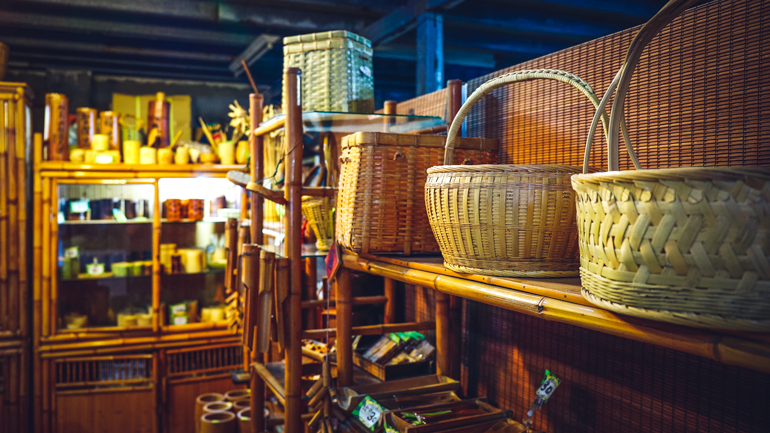
Add: No. 31, Ln. 370, Ren’ai Rd., Zhudong Township, Hsinchu County
(新竹縣竹東鎮仁愛路370巷31號)
Tel: (03) 595-6965
Hours: 9:00-17:30; closed on Sunday
Beipu, Hsinchu (新竹北埔)
Beipu was settled by Hakka migrants centuries ago and has been a predominantly Hakka town ever since. It was once second only to central Hsinchu as a business center. With its long settlement history and abundance of historic buildings, it has preserved more Hakka elements than any other town. The lanes of this mountain town are tranquil and the old houses and trees create a beautiful street scene. In the area around the Old Street, many buildings from the Qing dynasty and Japanese Colonial Period survive. Most are private property, but some old houses are open to the public on occasion and the chance to enter and take a look around should not be missed. Nanpu Community is only around five minutes by car from Beipu Old Street but it is a quiet rural community where visitors can learn about traditional farming and experience the life of a farmer.
Getting There
From TRA Zhubei Station/HSR Hsinchu Station take a Taiwan Tourist Shuttle bus (5700, Lion’s Head Mountain Route) and get off at Beipu Old Street (北埔老街).
Beipu Old Street
(北埔老街)
Close to Beipu Old Street there are still buildings from the Qing dynasty and Japanese Colonial Period. One of these, Jinguang Fugong Hall, was a settlement office established in 1835, symbolizing the cooperation between settlers from Fujian and Guangdong provinces at the time. Citian Temple was built in 1846 and is a local belief center. Zhongshu Hall was completed in 1922; it was built by the first scholar from Beipu to pass the imperial examinations in the Qing dynasty.
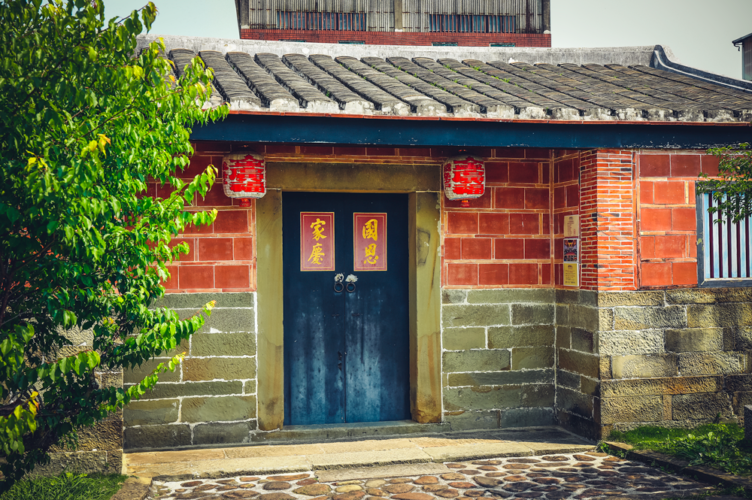
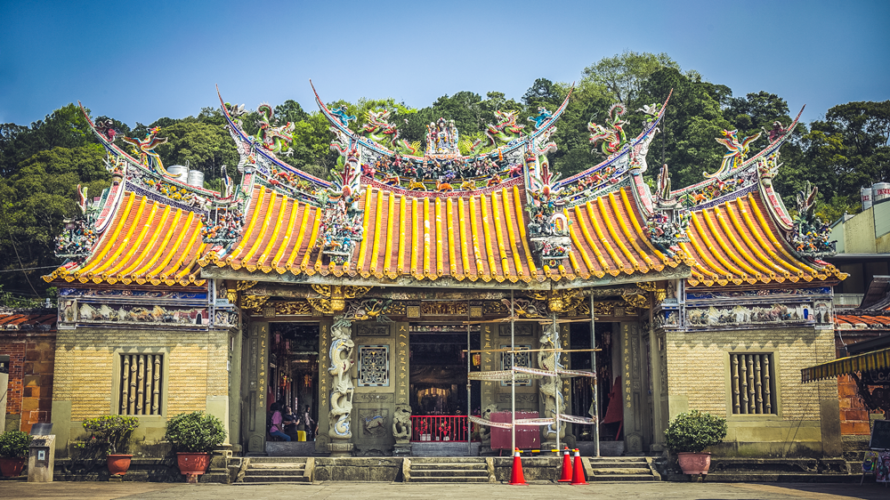

The Jiang family made a fortune during the early settlement process and left many old houses in the area of the old street. One example is Tianshui Tang, known as the “Jiang House,” where Jiang descendants still live today. Jiang Ah Hsin Residence is a Baroque-style Western building completed in 1949. The owner, Jiang Ah Hsin, was a rich Beipu black-tea merchant. Jiang Family Ancestral Temple, built in 1924, is one of the four main ancestral temples of Taiwan.
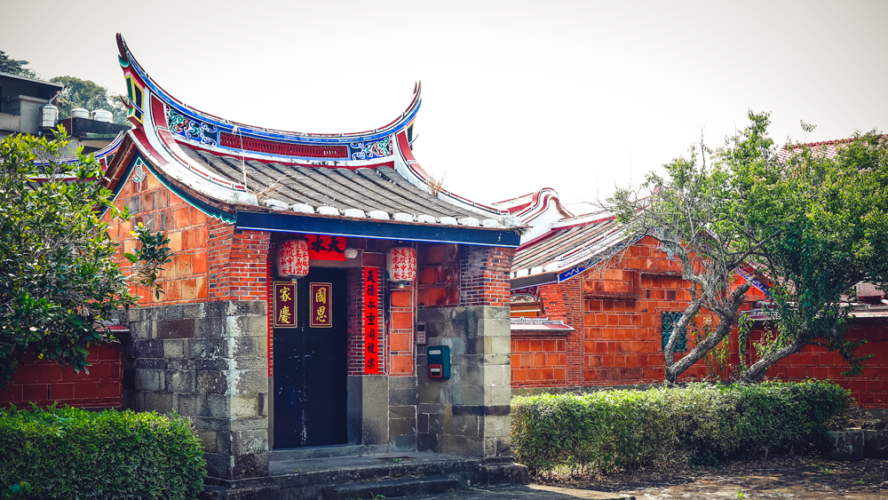
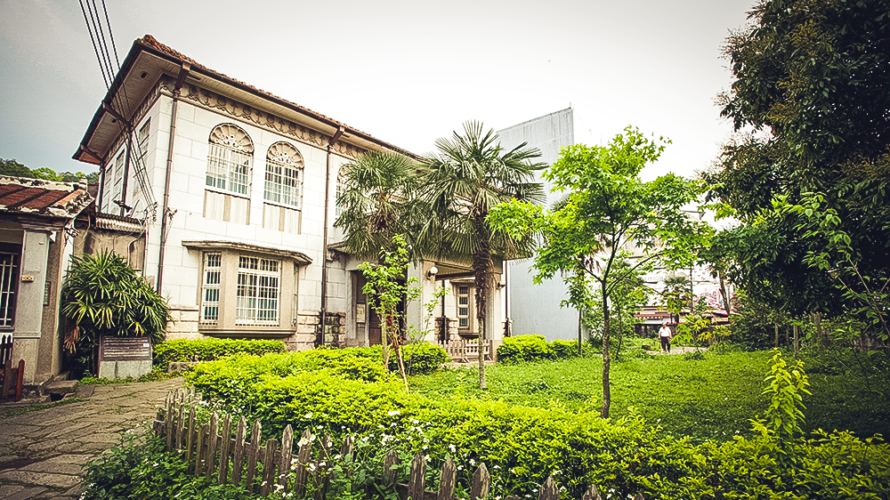
Nanpu Community
(南埔社區)
Although not far from Beipu Old Street, Nanpu Community has different scenes to the bustling Old Street and still has the slow-paced atmosphere of a rural village. This small rural community actually has a few surprises in store, such as a 100-year old water wheel, an irrigation channel with a story attached, a century-old Hakka house named Jinjian Hall, and crops produced using nature-friendly farming practices.
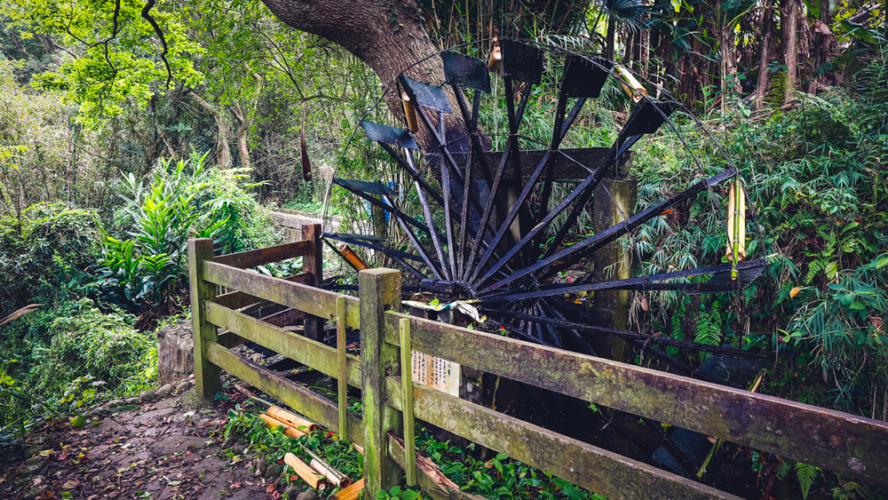

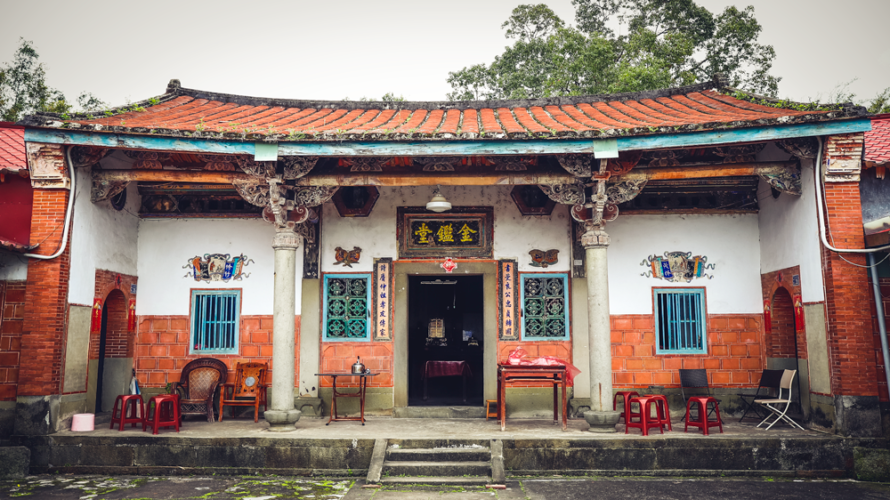
There is an antique farming implement exhibition hall behind the old Jinxiu Hall where visitors can learn about the traditional way of life in a farming village. This is a great spot for family visits.


The community has a few stores worth checking out, such as Le Tian Yuan (HuKu PuKu), which sells environmentally-friendly foods and daily use general goods and offers a simple afternoon tea.


Le Tian Yuan
(樂田園)
Add: No. 1-7, Neighborhood 1, Nanpu Village, Beipu Township, Hsinchu County
(新竹縣北埔鄉南埔村1鄰1-7號)
Another, BK Fang bakery has a wood-fired oven that is used to bake tasty handmade bread.
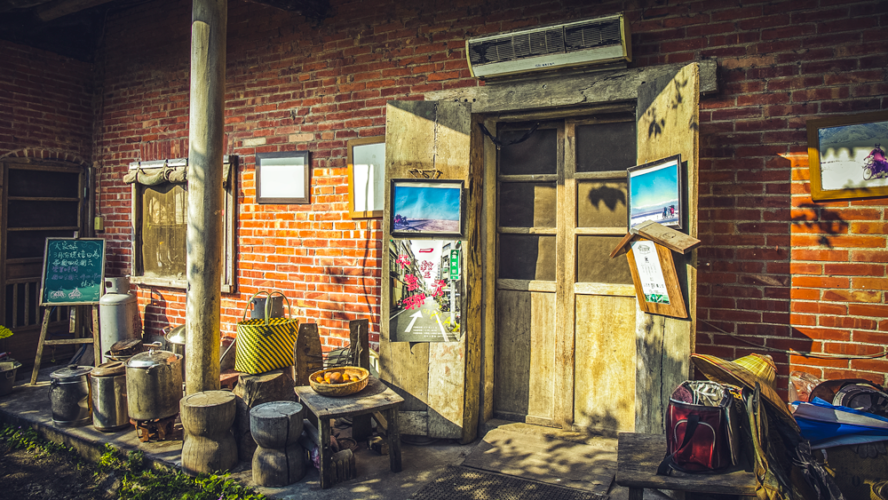
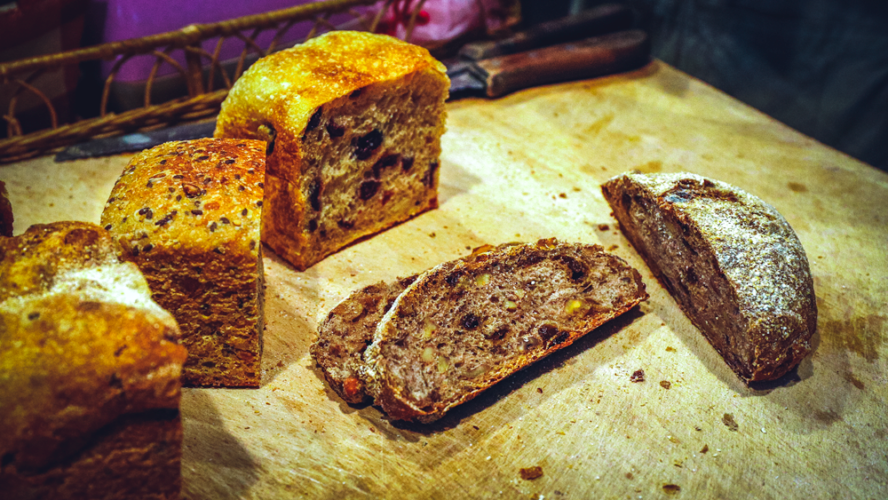
BK Fang
(BK坊)
Add: No. 30, Neighborhood 3, Nanpu Village, Beipu Township, Hsinchu County
(新竹縣北埔鄉南埔村3鄰30號)
Beipu Food
Beipu Old Street has quite a few small eateries where authentic Hakka food can be enjoyed. Among these foods are steamed vegetable buns, persimmon cakes, and various kinds of Hakka rice-based foods. Old Street Rice Noodles, Chun Jiao Rice Noodles, and Liu Family Bistro are all well-known eateries in the town. Lei tea is a traditional Hakka drink made by grinding pumpkin seeds, peanuts, sesame, tea leaves, and other ingredients into a powder and then adding hot water. The drink is a must-try when visiting a Hakka settlement. The Old Street has a few Hakka teahouses to choose from such as Hakka Leicha and Shuijing Teahouse (The Well). The characterful Shuijing Teahouse specializes in lei tea and operates in an old house.



Shuijing Teahouse
(水井茶堂)
Add: No. 1, Zhongzheng Rd., Beipu Township, Hsinchu County
(新竹縣北埔鄉中正路1號)


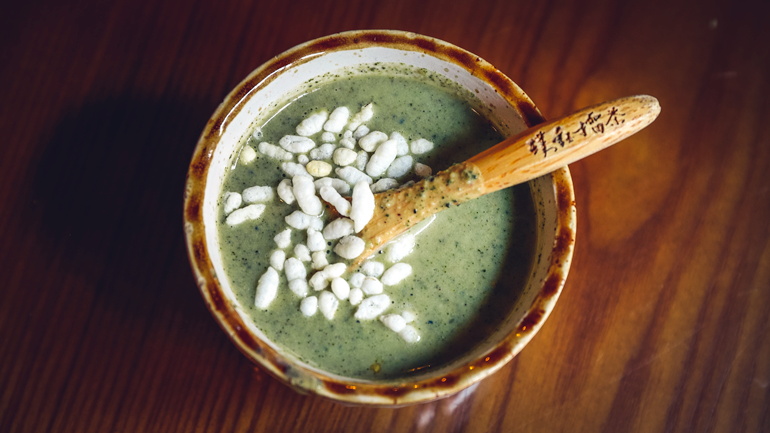
Puyu Hakka Tea
(璞鈺擂茶)
Add: No. 8, Miaoqian St., Beipu Township, Hsinchu County
(新竹縣北埔鄉廟前街8號)
Recommended Restaurant
Beipu Di Yi Zhan
(北埔第一棧)
Add: No. 31-1, Shuiji Village, Beipu Township, Hsinchu County
(新竹縣北埔鄉水際村31-1號)
Tel: (03) 580-1126
Hours: 9:00-21:00
Xinpu, Hsinchu (新竹新埔)
Info added on March 27, 2020.
Jin Han Dried Persimmon Farm
Sleepy Xinpu, where most of the action lies along the main road through the settlement, lies to the northwest of Guanxi and is practically synonymous with dried persimmons. Take a tour of the Jin Han Dried Persimmon Farm to witness the process by which these delicious morsels are created. Visitors can try various types of persimmons, drink persimmon tea, and learn crafts such as persimmon dyeing. The best time to visit is from September through December, when endless rows of drying fruit in large baskets propped up above human height make for colorful photo opportunities. Every October, the local farmers’ association puts on a dried-persimmon festival to showcase local products; visitors can enjoy good food, games, performances, and a parade.


Jin Han Dried Persimmon Farm (金漢柿餅教育農園)
Add: No. 501, Sec. 1, Zaokeng Rd., Xinpu Township, Hsinchu County
(新竹縣新埔鎮旱坑路一段501號)
Tel: (03) 589-2680
Website: www.facebook.com/JinHanDriedPersimmon.tw
Diane’s Garden
Info added on March 27, 2020.
Tucked away down a narrow tree-shaded lane in a rural area southeast of Xinpu town, Diane’s Garden is a slice of southern France transported smack into the middle of the local landscape. Its charming wood terrace overlooks lush fields of rice. A stylish gate opens up to a rustic French-style villa with an expansive lawn often used for events and weddings. The villa’s namesake owner employs natural, eco-friendly landscaping techniques, with a pretty ecological pond and a stone path leading up the hill behind the villa lined with orange jasmine shrubs and other local flora that Diane personally planted and can tell you all about.
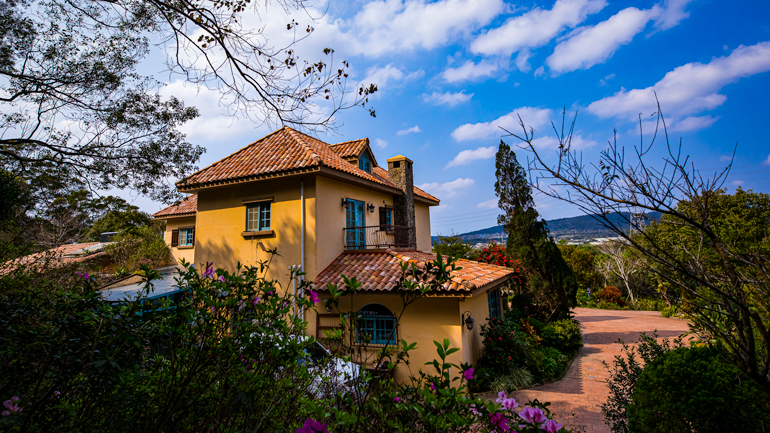
In addition to the resident cats, and the dog conspicuously decked out in an argyle sweater, butterflies flutter through the garden and the chirping of birds and crickets punctuate the babble of a close-by river. The grounds make for a pleasant afternoon stroll after enjoying a meal or coffee in the painstakingly designed dining room, fitted out with decorations made from repurposed materials. Enamored with the architecture during a trip to southern France when she was young, Diane spent two years building this place from scratch, and unlike many faux-European inns that can be quite tacky and over-the-top, her place is tasteful and authentic.
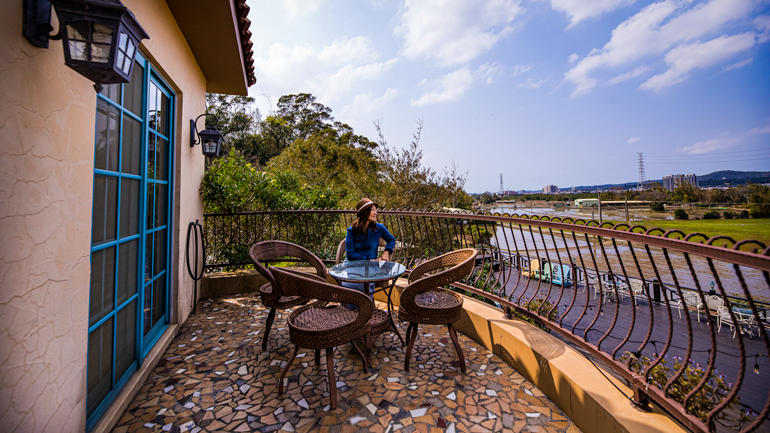
Diane’s Garden (黛安莊園)
Add: No. 9, Aly 1, Ln. 1102, Yundong Section, Guanpu Rd.,
Xinpu Township, Hsinchu County
(新竹縣新埔鎮關埔路雲東段1102巷1弄9號)
Tel: (03) 588-8989
Website: dianegarden.com
Baozhong Yimin Temple
Info added on March 27, 2020.
In contrast to the serenity and elegance of Diane’s Garden, nearby is one of the two major local centers of Hakka yimin (“righteous people”) religious worship, paying tribute to members of local militias who sacrificed their lives when the militias rose up during the imperial era to defend home areas against rebel forces, and were honored by the Qing emperor. The Baozhong Yimin Temple, about a 10-minute drive from downtown Xinpu, began as a modest shrine in 1791 after the Lin Shuang-wen Rebellion, and has been greatly expanded since. It is the venue for an annual Yimin festival during the summer.
Baozhong Yimin Temple (褒忠亭義民廟)
Add: No. 360, Sec. 3, Yimin Rd., Xialiao Borough, Xinpu Township, Hsinchu County
(新竹縣新埔鎮下寮里義民路三段360號)
Also read
衛城的閱讀空間 Willie Chen’s Digest of Historic Places:
The Imperial Scholar House and Cheng’s Ancestral Shrine in First Chinese Fortified City in Northern Formosa【北台第一城, 新竹的進士第與鄭氏家廟祭祖】
Katy Hui-wen Hung:
Big Family Small Tales – Hsinchu Beipu (Han, Hakka and Saisiyat)





